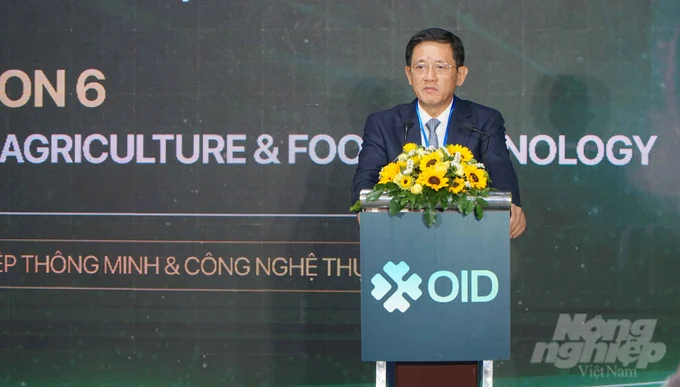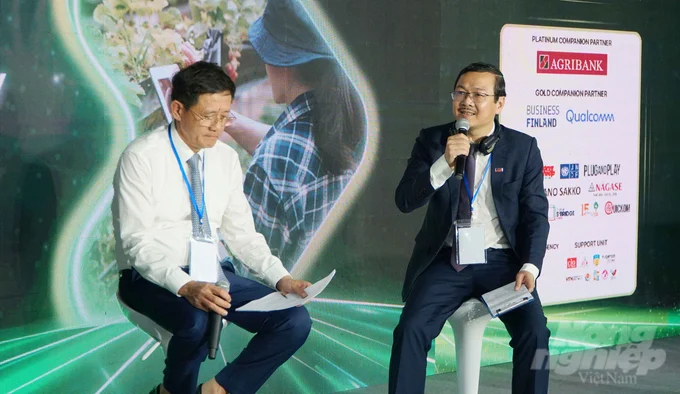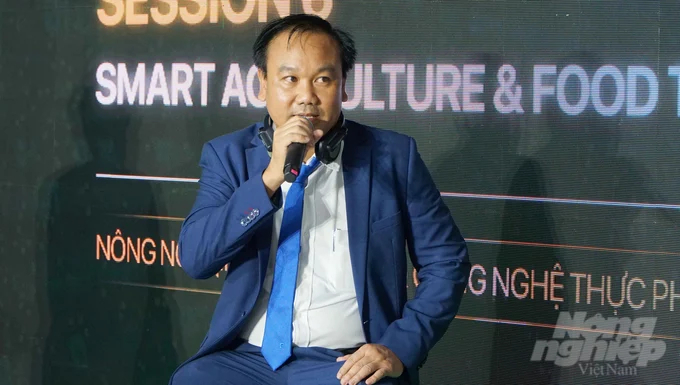November 26, 2025 | 23:15 GMT +7
November 26, 2025 | 23:15 GMT +7
Hotline: 0913.378.918
November 26, 2025 | 23:15 GMT +7
Hotline: 0913.378.918
This is the main content discussed enthusiastically by leaders, scientists and entrepreneurs at the seminar “Smart Agriculture and Food Technology” in Ho Chi Minh City. The discussion was held within the framework of the event Open Innovation Day 2023.
According to Mr. Duong Tat Thang - Director of the Department of Livestock Production (MARD), climate change, population growth, and competition for resources are pressuring the agricultural sector. Therefore, our country’s agriculture must transition to a circular economy.

Mr. Duong Tat Thang - Director of the Department of Livestock Production - spoke at the seminar. Photo: Le Binh.
“Circular economic development is a crucial trend in the world. Circular economy orientation in agriculture not only brings environmental benefits but also creates new business opportunities, increases competitiveness, and ensures sustainable development for the agricultural industry. Thanks to that, agricultural production will use resources economically and effectively, creating safe and high-quality products. Especially, the model will minimize and eliminate waste that causes environmental pollution, protecting the ecosystem and human health,” said Mr. Duong Tat Thang.
To achieve the above goals and realize the global commitment at COP 26 to achieve Net Zero by 2050, Vietnam’s agricultural sector needs to implement essential measures to optimize renewable energy and waste treatment, besides increasing awareness.
“Circular agriculture means not throwing anything away,” asserted Mr. Nguyen Dang Khoi, Chairman of Trong Khoi Group. With his experience, Mr. Khoi believes that farmers and businesses can profit from things that are considered waste. Agricultural by-products that are not reused are both wasteful and a burden to the environment.
“Wastewater and pig and chicken manure are actually valuable resources if we know how to make use of them. Pig and chicken manure is used as microbial fertilizer and fed into biogas plants as fuel. In addition to being sold to fertilizer factories, dry processed fertilizer can be used to fertilize plants. After treatment, wastewater can be used to irrigate crops,” Mr. Dang Khoi analyzed.

Mr. Nguyen Ngoc Thach - Editor-in-Chief of Vietnam Agriculture Newspaper (right) said that Vietnam Agriculture Newspaper will connect managers, businesses and scientists to raise awareness of circular agriculture. Photo: Le Binh.
With circular agriculture, the input of farming is the output of livestock and vice versa. For example, with coffee beans, some businesses take advantage of by-products such as coffee shells and leaves as substrates for mushrooms, bringing even higher value than the main product.
Regarding Vietnam’s commitment to reducing emissions, Mr. Nguyen Duc Tung, Vice President of the Vietnam Digital Agriculture Association, called this “green pressure,” which requires our country to have a roadmap. To overcome “green pressure,” applying technology in agricultural production becomes a prerequisite task.
“Agriculture, if supported by science and technology, will become an agricultural industry. The agricultural sector will attract investment, creating a large growth rate,” Mr. Nguyen Duc Tung shared.
Citing evidence of more than 3,000 livestock facilities in Dong Nai forced to relocate or stop production due to risks of affecting the environment, the Chairman of Trong Khoi Group said that from the beginning, livestock farmers and businesses did not consider the appropriate design and investment in technology.
“We invest huge amounts of money to buy land and build barns but forget about investing in technology in circular production. Untreated wastewater affects the environment. Meanwhile, if you research and invest a little more, you can take advantage of treated wastewater for irrigation, saving you from having to spend 100 - 200 million VND/month using groundwater,” Mr. Dang Khoi shared.

Mr. Nguyen Dang Khoi - Chairman of Trong Khoi Group. Photo: Le Binh.
Japanese scientists also presented at the seminar. Japan is known for its active scientific research and technology in circular production. Scientists in this country are striving to bring high-quality and eco-friendly products to the market. In particular, these products are all derived from agricultural by-products - raw materials from crop waste such as banana stems, sugar beets, etc.
Dr. Ryota Rose, lecturer at Tokyo University of Agriculture and Technology (Japan), said that these approaches all aim at stopping global warming. This is the duty of all people to protect our planet.
“We want to use more natural products not to affect the ocean or the atmosphere. We are very impressed with Vietnam’s banana tree. It is an eco-friendly biological material and is quite abundant creating many new products,” Dr. Ryota Rose expressed.
Also according to Dr. Ryota Rose, farmers need to have a more positive view of agricultural by-products since these are valuable and local resources. If done properly from the beginning and meets international standards, it will be possible to export by-products, increasing the value of circular agriculture.
Translated by Quynh Chi
/2025/11/26/4909-2-154329_878.jpg)
(VAN) Pearl grouper farming in HDPE cages not only delivers economic efficiency but also contributes to protecting the environment, creating jobs, and promoting marine-based experiential tourism.

(VAN) The model of making a living under the forest canopy through the agroforestry system in Van Son commune, Bac Ninh province, is expected to generate an annual income of approximately VND 30 million/ha.

(VAN) Many enterprises in Can Tho are harnessing natural energy and reducing greenhouse gas emissions in their production processes, thereby contributing to the promotion of a sustainable green transition.
/2025/11/24/3536-2-112800_176.jpg)
(VAN) Dong Nai now has tens of thousands of hectares of forests certified for sustainable management, and this area will continue to be expanded in the coming period.

(VAN) Vinh Ha hamlet (Dai Xuyen commune, Hanoi) is shifting away from small-scale farming as households adopt bioscurity into their breeder chicken models.

(VAN) Heavy rains make aquatic species more vulnerable to disease. Proactive water management and high-tech systems help farmers prevent outbreaks and protect yields.

(VAN) Greenhouses are shifting production mindsets in Binh Lu commune, enabling farmers to ‘weather the sun and rain’ and secure stable vegetable harvests throughout the year.